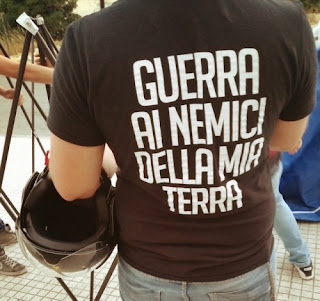"How do you define these fascists? They were of right and left, without being of right or left. They were pragmatic; not in the despicable sense that this term has taken today, because it is improperly used to mitigate the lack of benchmarks and coherence of politicians on all sides, but more precisely in the sense of a predominance of Practice on theory. It is certainly only right to define them as reactionaries in a sense, because they responded: against indignities and against injustices. But they did not react as the reactionaries usually do, that is, by automatism, opposition or imitation: they did so by taking the initiative. It is therefore correct to define them as interventionists, because, faithful to the spirit which animated the voluntary work of the Great War, they dictated and implemented the lines of action, intervened and even, in many cases, Anticipated the initiatives of the feudal
social(?)-communists and themselves opened the paths they followed. And once they were in power, they completely changed the social and economic organization of the nation, as well as its moral structure, by imposing ethics on a country that was then saturated by the hypocrisy of Savoy and the papacy .Of their whole being, therefore, they were revolutionaries. Fascinated by the impetuosity of a modernity to be shaped and dominated, they were never retrograde, did not suffer torticollis, at most were tempted repeatedly by the avant-gardism, especially by futurism. Enthusiastic and triumphant, they looked to the future, to a near future, who would have seen the awakening of the fatherland, the overthrow of the iniquitous social barriers and would have been characterized by social and moral progress in the name of dignity and justice. A new Rome, realistic, austere, warlike, industrious and constructive. The plow traces the furrow, the sword defends it."
-Gabriele Adinolfi
social(?)-communists and themselves opened the paths they followed. And once they were in power, they completely changed the social and economic organization of the nation, as well as its moral structure, by imposing ethics on a country that was then saturated by the hypocrisy of Savoy and the papacy .Of their whole being, therefore, they were revolutionaries. Fascinated by the impetuosity of a modernity to be shaped and dominated, they were never retrograde, did not suffer torticollis, at most were tempted repeatedly by the avant-gardism, especially by futurism. Enthusiastic and triumphant, they looked to the future, to a near future, who would have seen the awakening of the fatherland, the overthrow of the iniquitous social barriers and would have been characterized by social and moral progress in the name of dignity and justice. A new Rome, realistic, austere, warlike, industrious and constructive. The plow traces the furrow, the sword defends it."
-Gabriele Adinolfi





















Nenhum comentário:
Postar um comentário